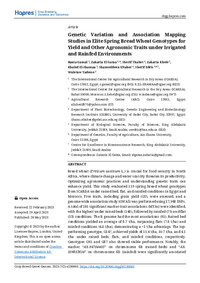Genetic Variation and Association Mapping Studies in Elite Spring Bread Wheat Genotypes for Yield and Other Agronomic Traits under Irrigated and Rainfed Environments

Authors:
Bread wheat (Triticum aestivum L.) is crucial for food security in North Africa, where climate change and water scarcity threaten its productivity. Optimizing agronomic practices and understanding genetic traits can enhance yield. This study evaluated 159 spring bread wheat genotypes from ICARDA under raised bed, flat, and rainfed conditions in Egypt and Morocco. Five traits, including grain yield (GY), were assessed, and a genome-wide association study (GWAS) was performed using 17,968 SNPs. A total of 181 significant marker-trait associations (MTAs) were identified, with the highest under raised beds (148), followed by rainfed (75) and flat (53) conditions. The B genome had the most associations (91). Raised bed conditions yielded an average of 8.7 t/ha, surpassing flats (7.8 t/ha) and rainfed conditions (4.0 t/ha), demonstrating a +1 t/ha advantage. The top-performing genotype, G147, achieved yields of 11.4 t/ha, 10.7 t/ha, and 4.1 t/ha under raised beds, flats, and rainfed conditions, respectively. Genotypes G91 and G87 also showed stable performance. Notably, the marker “AX-94704405” on chromosome 6B (raised beds) and “AX-109853614” on chromosome 6D (rainfed) were significantly associated with GY, making them promising for marker-assisted selection after validation. The identified high-yielding genotypes will be considered for direct release following adaptation trials and for use as parents in breeding programs to enhance wheat productivity under diverse environments.
